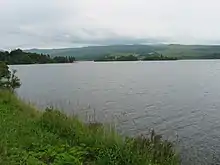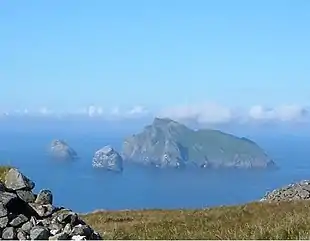| Scottish Gaelic name | Innis Chonain |
|---|---|
| Meaning of name | Island of St Conan |
| Location | |
 Innis Chonain Innis Chonain shown within Argyll and Bute | |
| OS grid reference | NN107258 |
| Coordinates | 56°23′N 5°04′W / 56.39°N 5.07°W |
| Physical geography | |
| Island group | Loch Awe |
| Area | 8 ha |
| Highest elevation | 62 m above sea level |
| Administration | |
| Sovereign state | United Kingdom |
| Country | Scotland |
| Council area | Argyll and Bute |
| Demographics | |
| Population | 5[1] |
| Population rank | 76 (Freshwater: 5) [2] |
| References | [3] |
Innis Chonain or Innischonan is an island in Loch Awe, Scotland connected to the mainland by a bridge.

Loch Awe showing some of the islands in the loch, including Innis Chonain
Architect, author and antiquarian Walter Douglas Campbell, a young brother of Archibald Campbell, 1st Baron Blythswood, purchased the island in the second half of the 19th century. He designed and built Innis Chonain House and also nearby St Conan's Tower for himself, his artist sister Helen and their mother the elderly Mrs Caroline Campbell of Blythswood House near Glasgow. Walter delighted in building unusual properties, including St Conan’s Kirk, which is on the mainland nearby, an eclectic blend of church styles.[4]
Footnotes
- ↑ National Records of Scotland (15 August 2013). "Appendix 2: Population and households on Scotland's Inhabited Islands" (PDF). Statistical Bulletin: 2011 Census: First Results on Population and Household Estimates for Scotland Release 1C (Part Two) (PDF) (Report). SG/2013/126. Retrieved 14 August 2020.
- ↑ Area and population ranks: there are c. 300 islands over 20 ha in extent and 93 permanently inhabited islands were listed in the 2011 census.
- ↑ Ordnance Survey: Landranger map sheet 50 Glen Orchy & Loch Etive (Map). Ordnance Survey. 2013. ISBN 9780319229781.
- ↑ "Lochawe". Undiscovered Scotland. Retrieved 24 August 2007.
Wikimedia Commons has media related to Innis Chonain.
This article is issued from Wikipedia. The text is licensed under Creative Commons - Attribution - Sharealike. Additional terms may apply for the media files.
